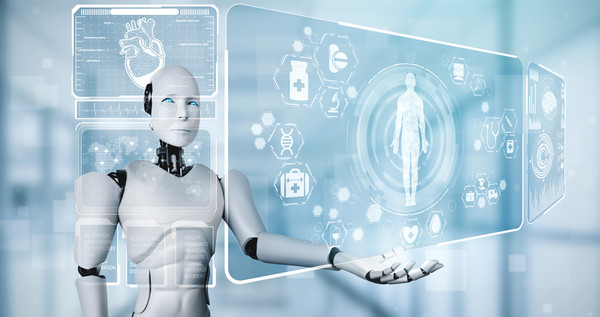Healthcare is struggling to keep pace with demand. Drug development is slow and costly, hospitals are overburdened, and clinical trials remain a major bottleneck in getting new treatments to patients.
Nvidia believes artificial intelligence (AI) could be the solution.
At a pre-briefing on Saturday (local time) ahead of the J.P. Morgan Healthcare Conference, the chipmaker—whose dominance in AI computing has fueled a stock market surge—unveiled a series of AI-driven initiatives aimed at some of the sector’s biggest challenges, including drug development, clinical trials, and hospital automation.
The specifics will be presented at the conference on Monday in San Francisco, but the company’s message is clear: AI is the infrastructure healthcare has been waiting for.

Through collaborations with Mayo Clinic, Illumina, IQVIA, and Arc Institute, Nvidia is bringing AI-driven automation and accelerated computing into medical research and clinical workflows. The company said these partnerships are designed to enhance diagnostic accuracy, streamline clinical trials, and expedite drug development.
“AI has the potential to significantly advance healthcare by enabling earlier disease detection and faster treatment discovery,” Kimberly Powell, vice president of healthcare at Nvidia, said. “By combining AI and computing with industry expertise, we hope to drive medical innovation and improve patient outcomes.”
AI in clinical trials: addressing one of medicine’s costliest bottlenecks
Clinical trials remain one of the most time-consuming and expensive stages of drug and medical device development. Nvidia is partnering with IQVIA, a company specializing in healthcare data and technology, to apply AI in optimizing clinical research workflows.
IQVIA’s dataset of anonymized health records from more than a billion patients across 100 countries will be used to train custom AI models built using Nvidia’s AI Foundry platform. These models will be designed to analyze trial data faster, refine patient recruitment strategies, and automate regulatory documentation—all major barriers to efficient drug development.
“The goal is to speed up trial execution while significantly reducing administrative burden on researchers,” Powell said.
AI in drug discovery: accelerating genomic research
Alongside its clinical trial initiatives, Nvidia is expanding its AI-driven drug discovery capabilities through a partnership with Illumina, a California-based biotechnology company specializing in DNA sequencing and genomic analysis.
By running Illumina’s DRAGEN secondary analysis software on Nvidia’s computing infrastructure, the companies hope to expand AI-driven genome analysis, potentially improving the identification of drug targets and biomarkers.
Additionally, Nvidia’s generative AI platform for chemistry and biology, BioNeMo, is being used to develop large-scale biological models that predict protein structures and design new molecules, further streamlining the drug development process.
AI in digital pathology: enhancing disease detection
Nvidia’s partnership with Mayo Clinic focuses on AI-driven digital pathology, particularly in cancer diagnostics.
Mayo Clinic’s digital pathology platform includes more than 20 million whole-slide images and 10 million patient records. Using Nvidia’s DGX B200 systems and MONAI, an open-source AI framework for medical imaging, Powell said researchers will train AI models capable of identifying diseases earlier and improving diagnostic precision.
“Our ultimate goal is to create a human digital twin—a dynamic digital representation including medical imaging, pathology, health records, and wearables,” she added.
Mayo Clinic and Nvidia are also working to develop AI-powered foundation models for pathology, using robotic labs and advanced imaging technologies.
AI in hospital operations: expanding automation and robotics
Beyond research and diagnostics, Nvidia is investing in AI-driven automation for hospital operations, developing robotics-assisted surgery tools, automated clinical documentation systems, and AI-powered patient monitoring solutions.
Unlike conventional AI models focused on data analysis, Powell said these “physical AI” systems will support real-world applications, including robotic-assisted surgery, hospital workflow optimization, and predictive patient monitoring.
Nvidia is working with system integrators, including Accenture, Capgemini, Deloitte, and Quantiphi LTTS, to scale AI adoption across the healthcare sector. The company’s Inception program, which supports AI startups, now includes more than 3,500 healthcare-focused companies, with 1,300 added in the past year alone.
While Nvidia estimates that AI-driven automation could optimize up to $3 trillion in healthcare spending, the company acknowledges that broad adoption will require industry-wide collaboration.
Related articles
- GI Innovation to focus on licensing deals at 2025 J.P. Morgan Healthcare Conference
- Celltrion to unveil new drug development strategies at 2025 J.P. Morgan Healthcare Conference
- Samsung Biologics to join J.P. Morgan Healthcare Conference for 9th consecutive year
- ENCell seeks global partnerships at J.P. Morgan Healthcare Conference
- Korean biopharma companies gear up for global expansion at J.P. Morgan Healthcare Conference 2025
- Onconic Therapeutics to showcase drug pipeline at JP Morgan Healthcare conference 2025
- Bridge Biotherapeutics to present IPF drug candidate at JP Morgan Healthcare Conference
- [JPM2025] J.P. Morgan Healthcare Conference opens with positive outlook for 2025, strong M&A expectations, and prominent Korean biopharma presence
- [JPM2025] J&J says Leclaza combo therapy’s potential is undervalued – and for good reason
- [JPM2025] HanAll Biopharma’s US partner says its drug is ‘sufficiently differentiated’ from competitors
- [JPM 2025] Samsung Biologics aims to strengthen global leadership with expanded capacity and portfolio
- [JPM2025] ‘JPM 2025 Korea Night’ colored San Francisco with K-Bio
- [Interview] Nvidia’s only Korean healthcare partner launches AI X-ray tool with Vision Pro, targets US rollout

